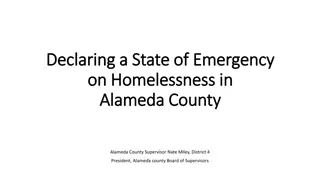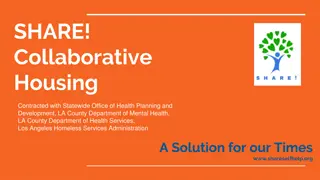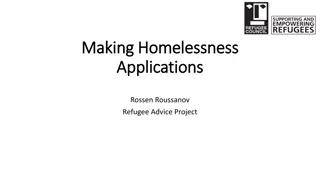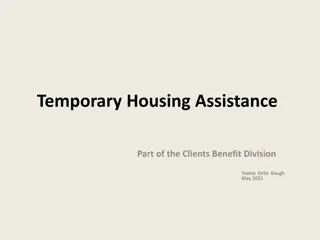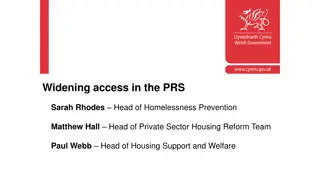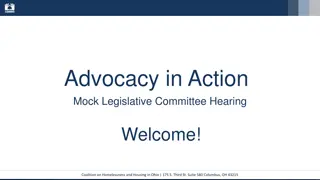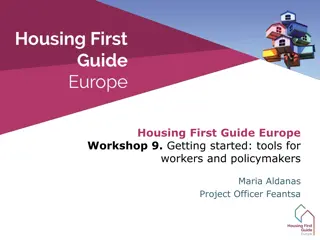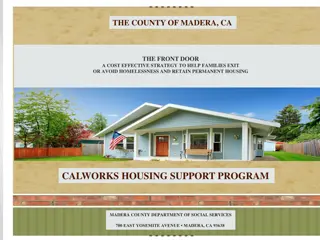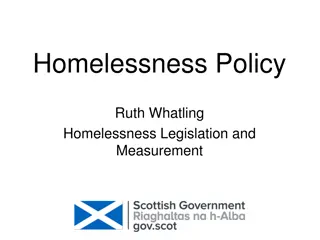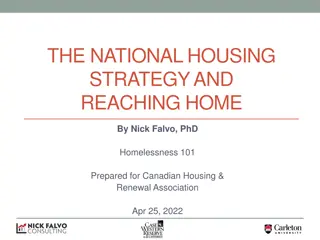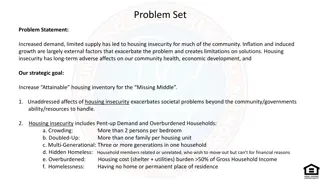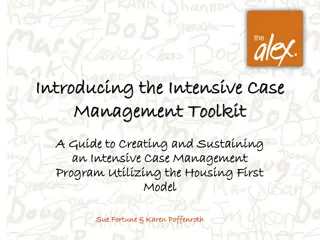Understanding Housing Needs Assessment to Prevent Homelessness
Housing Needs Assessment plays a crucial role in preventing homelessness by evaluating the circumstances that led to homelessness or the risk of it, identifying suitable accommodation, and determining necessary support for individuals and households. Authorities must consider various factors, including the size and type of accommodation needed, specific needs of disabled individuals, location preferences, and the holistic support requirements of applicants and household members. Sensitivity and tailored assessment tools are essential to encourage disclosure of needs and provide effective assistance in preventing or relieving homelessness.
- Housing Needs Assessment
- Homelessness Prevention
- Accommodation Evaluation
- Support Services
- Local Authorities
Download Presentation

Please find below an Image/Link to download the presentation.
The content on the website is provided AS IS for your information and personal use only. It may not be sold, licensed, or shared on other websites without obtaining consent from the author. Download presentation by click this link. If you encounter any issues during the download, it is possible that the publisher has removed the file from their server.
E N D
Presentation Transcript
Housing Needs Assessment: How to avoid challenge Andy Lane, Sarah Salmon & Tara O Leary
AGENDA What are we covering? 1. What is a Housing Needs Assessment? 2. Common problem areas. Coming up 3. Practice points. 4. Questions.
What is a housing needs assessment?
Housing Needs Assessment 3 April 2018 S.189A introduced by the Homelessness Reduction Act 2017, s.3 Same time as prevention & relief duties Linked especially with Personalised Housing Plans Pre-2018 requirement for an HNA for the intentionally homeless Assessment must be notified to the applicant in writing: s.189A(3) Overlap with suitability challenges
Housing Act 1996 Section 189A (2)The authority's assessment of the applicant's case must include an assessment of (a) the circumstances that caused the applicant to become homeless or threatened with homelessness, (b) the housing needs of the applicant including, in particular, what accommodation would be suitable for the applicant and any persons with whom the applicant resides or might reasonably be expected to reside ( other relevant persons ), and (c) what support would be necessary for the applicant and any other relevant persons to be able to have and retain suitable accommodation.
Homelessness Code of Guidance for Local Authorities Section 11 11.10 When assessing the housing needs of an applicant housing authorities will need to consider the individual members of the household, and all relevant needs. This should include an assessment of the size and type of accommodation required, any requirements to meet the needs of a person who is disabled or has specific medical needs, and the location of housing that is required. The applicant s wishes and preferences should also be considered and recorded within the assessment; whether or not the housing authority believes there is a reasonable prospect of accommodation being available that will meet those wishes and preferences. 11.11 An assessment of the applicant s and household member s support needs should be holistic and comprehensive, and not limited to those needs which are most apparent or have been notified to the housing authority by a referral agency. Housing authorities will wish to adopt assessment tools that enable staff to tease out particular aspects of need, without appearing to take a checklist approach using a list of possible needs. Some applicants may be reluctant to disclose their needs and will need sensitive encouragement to do so, with an assurance that the purpose of the assessment is to identify how the housing authority can best assist them to prevent or relieve homelessness.
Housing Act 1996 Section 189A HNAs are challenged by way of judicial review, not s.202 review. BUT: In deciding what reasonable steps it will take to prevent (s.195(3)) and relieve (s.189B(3)) homelessness, LHA must have regard to their assessment of the applicant s case under s.189A Statutory review is available of the LHA s decision as to the steps it will take to prevent and relieve homelessness: ss.202(1)(ba)(i) and (bc)(i) Code Guidance para. 11.36: Applicants have a right under section 202 to request a review of the reasonable steps the housing sections 189B(2) and 195(2) which includes having regard to their personalised housing plan within the prevention and relief stages. Housing authorities should encourage applicants to raise any concerns they have about their plan and work to resolve disagreements to minimise the occasions on which the applicant will feel the need to request a review. authority is to take under
Common Problems Overview 1. Insufficient. 2. No assessment (just recording of applicant s wishes): see R(ZK) v Havering LBC [2022] H.L.R. 47 at 42. 3. Not supplied to applicant. 4. Obvious omissions. 5. Not updated/reviewed. 6. The Code recommends that at least one face-to-face interview should be carried out before the housing needs assessment process is completed: paragraphs 11.14 - 11.15: R(UO) v Redbridge LBC [2023] EWHC 1355 (Admin) at 59, 95
Court review Administrative Court R(YR) v Lambeth LBC [2023] H.L.R. 16 out of borough placement; needs of children and impact of school move not referred to in HNA/PHP; unlawful. S11 CA2004 overlap. R(XY) v Haringey LBC [2019] EWHC 2276 (Admin) at 52 advise applicant of the assessment in writing Pre-Homelessness Reduction Act 2017 R(S(Albania) v Waltham Forest LBC [2016] H.L.R. 41 need to undertake HNA before deciding not to exercise section 192 discretion not to accommodate R(Savage) v Hillingdon LBC [2010] P.T.S.R. 1859 requirement of HNA in IH case post s184 and pre-s190(2)(b) advice & assistance
Judicial oversight Legal challenges to HNAs Whilst the assessment does not have to deal with and set out every need that an possibly have, nevertheless set out the key needs that would provide the "nuts and bolts" for any accommodation: R (S) v Waltham Forest LBC [2016] EWHC 1240 (Admin) [92] per Upper Tribunal Judge Grubb. This duty is important because it determines any decision on the suitability of accommodation. While it does not need to include an exhaustive list of housing needs, it does need to needs: those that would provide the "nuts and bolts" for any offer of suitable accommodation: c.f. R(S) v Waltham Forest LBC [2016] EWHC 1240 (Admin) [2016] H.L.R. 41 at [92]. applicant it might should include the key offer of Mr Justice Lane in R (UO) v LB Redbridge [2023] Admin at 60. EWHC 1355 Judge Havering [2022] H.L.R. 47 at 17. Allegra in R (ZK) LB
R(XY) v Haringey LBC [2019] EWHC 2276 (Admin) DHCJ Clive Sheldon KC 66 An assessment does not need to be a counsel of perfection. Although the local housing authority should ask the right questions when carrying out an assessment, or on a review of an assessment, and in some circumstances may be required to seek the advice and input of other agencies (e.g. local health and children's services) to ensure that the applicant's needs were property understood, it can ordinarily be expected to rely on the fact that the applicant for housing will let it know what her fundamental needs are. The applicant is frequently the person who best knows her needs and those of any of her children. If the applicant fails to inform the local housing authority of any particular needs, this will rarely lead to a finding of unlawfulness if the local housing authority fails to identify one or other of the applicant's particular needs. 62 I acknowledge that this Court should not treat the documents in the housing file as if they were a piece of exquisite draftsmanship, and a commonsense approach should be taken. The Court should ask itself how a reasonable and sensible housing officer would understand what had been written. 63 The failure to identify this as a need for XY had the practical consequence that she was offered accommodation where she would have had to use stairs which was obviously unsuitable for her. In the circumstances, the inadequacy of the assessment was not merely a technical matter, but had real- life consequences for XY.
Overlap with Public Law Duties Further Enquiries the duty of assessment in s. 189A and the duty to make inquiries under s 184 and s. 188(1), read in the light of s. 11(2) of the Children Act 2004 and Tameside, required the Defendant to conduct further inquiries: see above, paragraph 52.i). No reasonable authority with the information available to the Defendant would have failed to undertake inquiries as to the disruption to the children s education if they were required to move school before concluding accommodation far from their schools was suitable for the purposes of s. 206 and that it was not 'reasonably practicable' to accommodate them in or near Lambeth. The reasonable inquiries that an authority is required to take as part of its assessment should be evident from the s. 189A assessment or housing plan, or at least should be evidenced on the housing file. They are not. YR v Lambeth LBC at 88(iv) The Defendant must be able to demonstrate that it has applied its Placements Policy properly: above, paragraph 56. In my judgment, that duty to demonstrate compliance with a published policy by way of a contemporaneous, reasoned decision, applies even when there is no statutory duty to give reasons. R(YR) v Lambeth LBC [2023] H.L.R. 16 at 86 YR v Lambeth LBC at 88(iii)
Remember ...needs Approach the HNA from the right starting point. Applicant's needs vs. Applicant's wishes i.e. identify what is needed as distinct from what would be nice to have . The assessment does not, in my judgment, have to deal with and set out every need that an applicant might possibly have. It should, however, set out the key needs: those that would provide the "nuts and bolts" for any offer of accommodation: c.f. R (S) v. Waltham Forest LBC [2016] EWHC 1240 (Admin)at [92]. R(XY) v Haringey LBC [2019] EWHC 2276 (Admin) at [51], DHCJ Clive Sheldon KC Think about and ask material questions. Make any enquiries that may be relevant to needs. Don't just state the obvious.
Remember ...assessments Assessment does not need to be in one document: XY v Haringey at [54] Assessment may be included with PHP a flawed assessment may = a flawed plan: R(YR) v Lambeth LBC [2023] H.L.R. 16 at 89. Notify the applicant of the assessment section 189A(3). The assessment requirement continues until any Part 7 duty ends section 189A(9)(10). Be clear: The key is whether the assessment is sufficiently clear as for it to be obvious to the "reasonable and sensible housing officer" what exactly is needed for the Claimant and his family R(ZK) v Havering LBC [2022] H.L.R. 47 at 45 (and see 46 and XY v Haringey at 62). Be careful if using a template. Keep under review and update.
Remember reasons R(YR) v Lambeth LBC [2023] H.L.R. 16 at [88] Third, the s.189A housing assessment and plan were inadequately evidenced and reasoned to demonstrate that the Defendant had regard to the statutory relevant factors and other matters set out at paragraph 65, above, even applying a 'benevolent' rather than 'an overly technical' or 'nit-picking' approach to the construction of those documents. I do not consider it appropriate for me to infer that the Defendant had regard to those matters, for the reasons given by Baroness Hale in Nzolameso, [31-35]: above, paragraph 52.ii). I accept the Defendant s argument that Baroness Hale s observations as to reasons in Nzolameso [31-35] were made in the context of a statutory duty to give reasons in s.203(4). I also accept that there is neither a statutory nor a common law duty to give reasons as to the suitability of accommodation provided under s.188(1), applying Akhtar and Alibkhiet: above, paragraph 58. However, the latter cases are to be distinguished, and Nzolameso is relevant and persuasive
Questions This Photo by Unknown author is licensed under CC BY.
Contact details: Cornerstone Barristers 2-3 Grays Inn Square London WC1R 5JH Tel: Fax: 020 7242 4986 020 3292 1966 Email: toleary@cornerstonebarristers.com You can also contact our clerking team via clerks@cornerstonebarristers.com alane@cornerstonebarristers.com ssalmon@cornerstonebarristers.com



